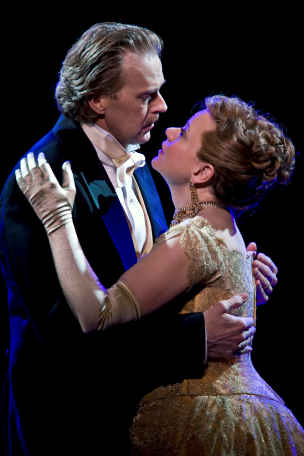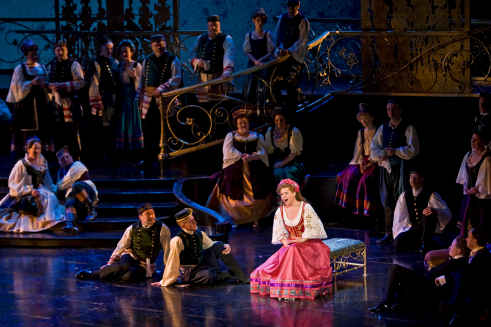Other Links
Editorial Board
- Editor - Bill Kenny
- London Editor-Melanie Eskenazi
- Founder - Len Mullenger
Google Site Search
SEEN AND HEARD OPERA REVIEW
Lehár, The Merry Widow:
Soloists, Chorus and Orchestra of
the English National Opera. London Coliseum, 1.5.2008 (JPr)
In its golden years English National Opera performed this sort of
music very well, had the singers with the style to sing it and
directors who would stage it sympathetically. In 2008 then,
one out of three is the best we can expect but it was at least the one that
meant it all looked good and was a masterly recreation of the Belle Époque of fin de siècle
Paris. The sets were applauded as soon as the curtain went up. In
perhaps the too safe hands of veteran opera director, John Copley
(who replaced Jude Kelly at Christmas), and with
A Gilbert and Sullivan specialist, Richard Suart, was a suitably
buffoonish elderly Baron Zeta. I warmed very much to Alfie Boe’s
ardent Camille who pursues Zeta’s young wife Valencienne
sung by Fiona Murphy and undoubtedly the star singer of the
evening, the one with the greatest sense of style. The weakness
was the two principals; both of whom gave fine performances
in the end but without capturing the real essence of the genre. Danilo must be
funny and moving, a raffish charmer, a bit like Leslie Phillips. Tall and gangly John Graham-Hall neither waltzed well enough nor
sang elegantly enough when necessary. Amanda Roocroft’s Hanna
Glawari had been clearly asked to overemphasise her northern
vowels but she is not a great light comedian judging by this
performance. She is an experienced singer for operatic
tragic heroines and this seems to have taken a toll on her voice
which lacked the flexibility and secure top notes that her Act II
‘Vilja’ demands. As a result it was not the showstopper it should
be.

John Graham-Hall (Danilo
Danilowitsch) & Amanda Roocroft
(Hanna
Glawari)
The history of The Merry Widow is interesting because it is
based on
Henri
Meilhac’s 1861 French comedy L'attaché d'ambassade
(The Embassy Attaché.) The play had a certain Baron Scharpf,
the Parisian ambassador of an impoverished German duchy needing to
arrange a marriage between his country's richest widow, Madeline
von Palmer, and embassy attaché Count Prachs : thereby staving off
economic disaster in their homeland. The original Paris production
at the Théâtre du Vaudeville lasted only 15 performances but
a German adaptation was better received and was revived from time
to time. In early 1905 it came to the attention of librettist Leo
Stein who considered it a potentially successful operetta
and took it to his occasional collaborator
Victor Léon.
Vienna’s Theater an der Wien had not had a great hit since Der
Opernball (The Opera Ball) before the end of the nineteenth
century. The theatre manager Wilhelm Karczag was looking for a new
operetta with a Parisian setting, and a musical version of Der
Gesandschafts Attaché sounded like a good idea. Short
of funds and without a Graham Norton BBC casting show to create
cheap publicity, the management kept their investment in Die
lustige Witwe, as the operetta was now titled, to a minimum by
using old sets and costumes. Mentioning Meilhac's original play
would have meant paying rights fees so it was originally described
as ‘partly based on a foreign source’. The secondhand production
had a first-rate cast however. Veteran operetta performers, Mizzi Gunther
and Louis Treumann were the first choices for Hannah Glawari and
her once and future lover, Count Danilo. Like the composer, the
two stars firmly believed Die lustige Witwe would succeed.
Gunther paid for her own lavish costumes, and Treumann ordered a
costly replica of a real prince's dress uniform. He was Crown
Prince Danilo of Montenegro who had inspired the character’s name
and whose country had been the librettists’ model for the
impoverished Balkan state they renamed ‘Pontevedro’. Karczag was
still uncertain whether it would make any money and offered Lehár
5000 crowns to shut down the production. In fact when Lehár first
played the music to Karczag he found the melodies so unusual and
the harmonies so lush that he commented ‘This isn’t music!’
Quickly the operetta reached its 300th performance and the
producers at last provided new sets and costumes and later, Lehár
marked the 400th by adding a new overture. Strangely, Lehár who had
accepted the mantle of one Strauss (Johann) later in life
collaborated like another famous composer of his generation,
Richard Strauss, with the Nazis; Adolf Hitler had been a lifelong
fan of The Merry Widow and awarded the composer the Goethe
Medal. Lehár died in exile in Switzerland in 1948.

Full Stage Set with Amanda Roocroft (Centre)
Xenophobia is never far away most notably in Roy Hudd’s Act III
patter song ‘Très, Très, Très Français’ and as Njegus he ended up
complete with beret, bicycle and garland of onions. This was sung
to original music Lehár interpolated into the 1907 London
production but was given new lyrics by Jeremy Sams. Admittedly, to
see the veteran vaudevillian Roy Hudd, at the old London
Coliseum, once a famous music hall, was one of the delights of the
evening. His comic timing showed up the lack of it in those around
him.
To be honest, Act I did not
work too well as the singers were either too far on one side of the stage
or being rushed in and out of doors French-farce style. It was
difficult to keep hearing Pontevedro as the ‘Fatherland’ as that
has other connotations and the translation was a little prosaic
‘It might have been better if I had not met you’ and ‘Being
sycophantic isn’t very romantic’ gives an idea of how it was. In
fact it less resembled operetta than the Marx Brothers’ opening
scene in ‘Duck Soup’, the basic premise of which
also involves a bankrupt state and a dowager millionairess : a
‘skit’ on that movie for this production might have made for a
more unique evening. I enjoyed the other two Acts a great deal
more and they seemed better rehearsed with a greater joie de vivre
from the ensemble. Admittedly though, the Act II ‘concert party chorus
line’ septet ‘Who can tell what the hell women are?’ was straight
from another long-running British sitcom ‘It Ain’t Half Hot Mum’.

Fiona Murphy (Valencienne)
& Alfie Boe (Camille de
Rosillon)
Oliver von Dohnanyi’s conducting of his exemplary orchestra seemed
to be overemphasising the music rather too much, the production in
Act I was perhaps was not intimate enough and neither was his
accompaniment throughout the evening. In operetta, the words tell
the story and the music just underlines the emotional atmosphere.
Here unnecessarily grand statements appeared to be attempted and
there was too little Viennese schwung. Perhaps he will
relax a bit more as the run of performances continues.
I did enjoy this unashamedly old-fashioned evening well
enough however. Viennese operetta performed like this, is an innocent
and somewhat innocuous diversion for an opera company getting the
unworthy reputation of having most of their productions involving
scenes in a washroom. But operetta is a diversion from real life
too which should draw you into a fantasy world of romantic comedy
and then
steal your heart away. I have seen operetta in Vienna and
memorably many years ago with ENO and to be performed correctly it
needs sufficient artists of personal charisma and vocal beauty to
bring these hackneyed yet well-loved old tunes to life. The mix
was just not completely right here.
All Pictures © Clive Barda
Back
to Top
Cumulative Index Page
